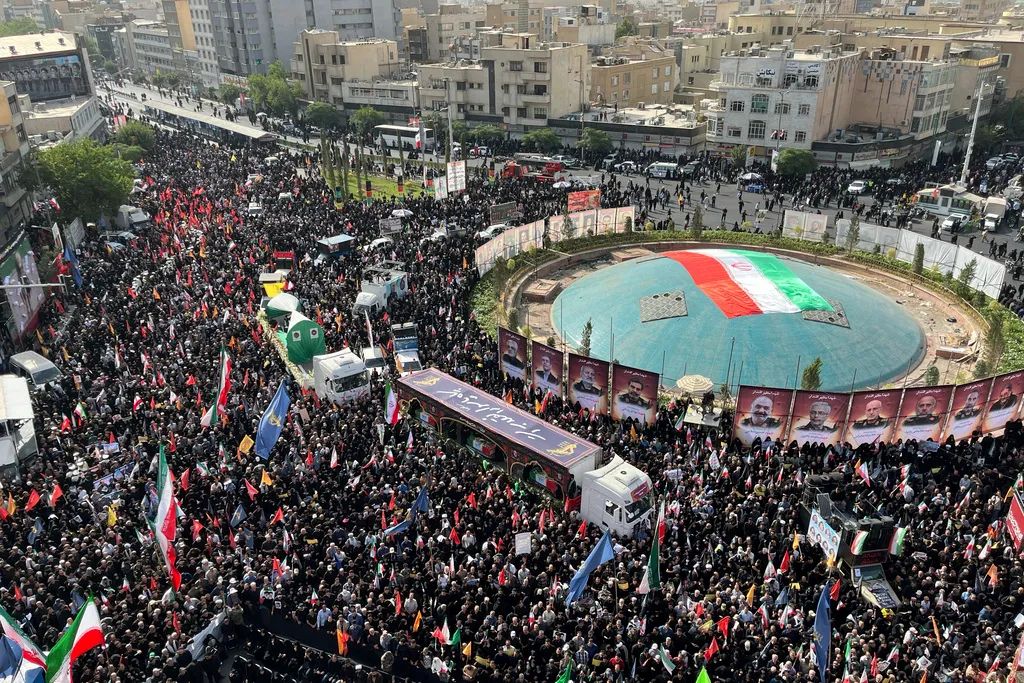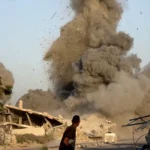
Iran conducted a state funeral for approximately 60 people killed during its recent 12-day conflict with Israel, including military commanders and nuclear scientists.
Coffins draped in Iranian flags and bearing portraits of the deceased were displayed near Tehran’s Enghelab Square, surrounded by large crowds of mourners. The conflict concluded with a ceasefire after the United States intervened by bombing key Iranian nuclear facilities.
Crowds dressed in black chanted slogans, waved Iranian flags, and carried portraits of those killed. Authorities encouraged participation through media campaigns and provided free transportation, while government offices closed for the day.
Among those buried was Mohammad Bagheri, Iran’s highest-ranking military officer and chief of staff of the armed forces. Bagheri was interred alongside his wife and daughter, who died in an Israeli strike. Iranian authorities reported 627 total deaths in Iran, while Israeli officials stated 28 people were killed in Israel from Iranian missile attacks.
Other notable figures laid to rest included Hossein Salami, commander-in-chief of the Islamic Revolutionary Guards, and nuclear scientists such as Mohammad Mehdi Tehranchi, head of Azad University in Tehran.
The ceremony was attended by prominent officials including Iranian President Masoud Pezeshkian and Rear Admiral Ali Shamkhani, an advisor to Supreme Leader Ayatollah Ali Khamenei. Shamkhani had been injured in an earlier Israeli strike.
Following the funeral, President Trump indicated he would “absolutely” consider bombing Iran again. When questioned by the BBC’s Nomia Iqbal at a White House briefing, Trump said he would “without question” attack if intelligence suggested Iran could enrich uranium to dangerous levels.
Trump also disputed Iran’s claims of victory, calling the country “decimated” and challenging Supreme Leader Khamenei’s statements. He claimed knowledge of Khamenei’s location during the conflict, stating he prevented Israel or U.S. forces from “terminating his life.”
Iran’s Foreign Minister Abbas Araghchi criticized Trump’s “disrespectful” comments about Khamenei, who claimed U.S. and Israeli strikes achieved “nothing significant.” Araghchi suggested Trump abandon his confrontational tone if genuinely seeking diplomatic solutions, adding that Iranians “do not take kindly to Threats and Insults.”
However, Araghchi acknowledged that “excessive and serious” damage occurred to Iran’s nuclear sites during the bombings.
The International Atomic Energy Agency (IAEA) reported uncertainty about the extent of damage to Iran’s nuclear capabilities, including highly-enriched uranium stockpiles and centrifuges. IAEA Director General Rafael Grossi stated that military action alone would not prevent Iran from developing nuclear weapons, telling CBS News that resolution requires “an agreement.”
Trump claimed on social media that he had been considering sanctions relief to aid Iran’s recovery but abandoned these efforts after Khamenei’s statements, saying he was “hit with a statement of anger, hatred, and disgust” and “immediately dropped all work on sanction relief.”












Be the first to leave a comment